
The Game Boy Advance (GBA) is a 32-bit handheld game console developed, manufactured and marketed by Nintendo as the successor to the Game Boy Color. It was released in Japan on March 21, 2001, in North America on June 11, 2001, in the PAL region on June 22, 2001, and in mainland China as iQue Game Boy Advance on June 8, 2004.
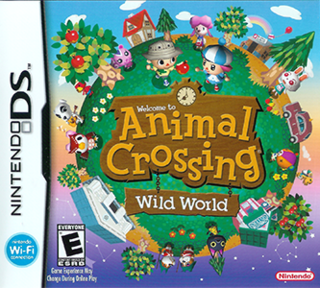
Animal Crossing: Wild World is a 2005 social simulation video game developed and published by Nintendo for the Nintendo DS handheld game console. It was released in Japan in November 2005, in North America and Australia in December 2005, and in Europe in March 2006. It is the second installment in the Animal Crossing series, and the sequel to Animal Crossing on the GameCube.
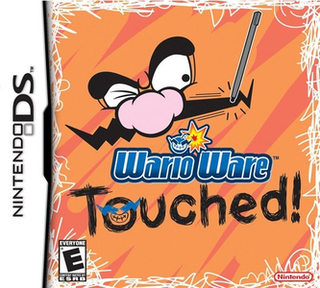
WarioWare: Touched! is a minigame compilation party video game released by Nintendo for the Nintendo DS. The fourth installment of the WarioWare series, and the first of three on the Nintendo DS, the game involves rapidly completing "microgames" — simple minigames lasting extremely short periods of time — as quickly as possible. The microgames are exclusively controlled with the Nintendo DS's touchscreen and microphone.
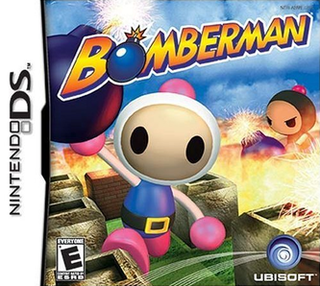
Bomberman is a 2005 video game developed by Racjin for the Nintendo DS. It was released by Hudson Soft in Japan on May 26, 2005, and published worldwide by Ubisoft. The game is notable for its chibi art style, previously seen in the Bomberman Land series.
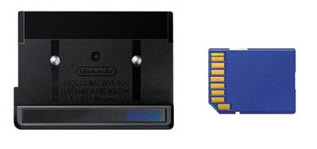
The Play-Yan is a media player designed for the Game Boy Advance SP and also compatible with the Game Boy Micro and Nintendo DS. It uses SD flash memory to play MP3 audio files and H.264/MPEG-4 AVC video files. It can also play 13 bonus mini-games, all of which are available freely on the Nintendo website in Japan. Sales of the Play-Yan were discontinued on September 11, 2005.

Mitsuo Terada, known professionally as Tsunku (つんく♂), is a Japanese singer, record producer, and songwriter. He is the lead singer of the rock band Sharam Q.

Rhythm Tengoku is a rhythm game developed and published by Nintendo for the Game Boy Advance. It was originally released on August 3, 2006, and was the last game released by Nintendo for the Game Boy Advance. An arcade version of the game was reprogrammed and published by Sega on September 20, 2007. Both versions were released in Japan exclusively. The game was the first in the Rhythm Heaven series which spawned three international sequels; Rhythm Heaven, Rhythm Heaven Fever, and Rhythm Heaven Megamix. It began as an idea created by its composer and supervisor Tsunku, who proposed it to Nintendo due to his belief that they could do a better job with it than he could.

Contra 4 is a 2D action game published by Konami Digital Entertainment in the United States and developed by WayForward Technologies. It is the eleventh overall installment of the Contra series, and was released in North America on November 13, 2007 for Nintendo DS. A mobile port was released six days later on November 19, 2007. A rerelease, called Contra 4: Redux, was released for Android in 2011.

Ontamarama is a rhythm game published by Atlus for the Nintendo DS. It was released in Japan in July 2007, and in North America on November 6, 2007. The game uses both of the DS's screens, touch functionality, and the microphone during game play. The story revolves around colorful spirits called Ontama, who live on a tropical island and can create music. The player must quickly capture Ontama with the stylus while keeping up with the beat.

Kirby Super Star Ultra is an anthology platform video game developed by HAL Laboratory and published by Nintendo for the Nintendo DS in 2008. The game is an enhanced remake of Kirby Super Star, originally released for the Super Nintendo Entertainment System in 1996, to commemorate the Kirby series' 15th anniversary. The remake retains all game modes found in the original, and adds four major new ones, along with adding updated visuals and full-motion video cutscenes.
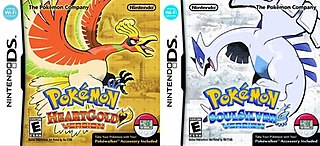
Pokémon HeartGold Version and Pokémon SoulSilver Version are 2009 remakes of the 1999 Game Boy Color role-playing video games Pokémon Gold and Silver, also including features from Pokémon Crystal. The games are part of the fourth generation of the Pokémon video game series, developed by Game Freak and published by The Pokémon Company and Nintendo for the Nintendo DS. In commemoration of the 10th anniversary of Gold and Silver, the games were released in Japan on September 12, 2009, and were later released in other regions during March 2010.

Space Bust-A-Move is a puzzle video game developed by Lancarse and published by Taito in Japan, and Square Enix worldwide for the Nintendo DS. It was first released in Japan under the title Space Puzzle Bobble on December 18, 2008. It was later released in North America under the title Space Bust-A-Move on July 28, 2009, and in Europe under the title Puzzle Bobble Galaxy on August 28, 2009. As with Arkanoid DS, Space Invaders Extreme and Space Invaders Extreme 2, the game is compatible with Taito's paddle controller.

Michael Jackson: The Experience is a music video game based on Michael Jackson's songs. It was developed and published by Ubisoft, and was released on 23 November 2010 in North America, 25 November 2010 in Australia and 26 November 2010 in Europe for the Nintendo DS, PlayStation Portable, and Wii. It was also released on 12 April 2011 in North America, 14 April 2011 in Australia and 15 April 2011 in Europe for PlayStation 3's PlayStation Move and Xbox 360's Kinect. The Japanese release on 8 December 2011 only revised the PlayStation 3, Xbox 360, and Wii consoles. The game features many of Michael Jackson's hits, such as "Bad", "Thriller", "Beat It", "Billie Jean", "Smooth Criminal", "Black or White", "The Way You Make Me Feel", etc. However, some songs like "Man in the Mirror" and "P.Y.T. " are excluded. Initial launches of the game included a limited edition replica of Jackson's sequined glove. It was later released for the Nintendo 3DS on 7 November 2011 in North America and 11 November 2011 in Europe, for iPhone and iPad on 7 December 2011 in North America and for PlayStation Vita on 15 February 2012 in North America, 22 February 2012 in Europe and 23 February 2012 in Australia. It was announced that the game would be released on Mac OS X, and iPad 2. The game sold 2 million units in two months, not including Japanese sales, making it one of the best-selling Wii title games.

Kirby Mass Attack is a 2011 platform game developed by HAL Laboratory and published by Nintendo for the Nintendo DS. Part of the Kirby series, it is the fourth and last game in the series to be released for the DS. The game was later released for the Wii U's Virtual Console.

Rhythm Heaven Fever, known in both the PAL regions as Beat the Beat: Rhythm Paradise, Minna No Rhythm Tengoku in Japan and Rhythm World Wii in Korea, is a music video game developed by Nintendo and TNX for Nintendo's Wii. It is the third game in the Rhythm Heaven series, following Rhythm Tengoku for the Game Boy Advance and Rhythm Heaven for the Nintendo DS, and was succeeded by Rhythm Heaven Megamix for the Nintendo 3DS in 2016. The game was released in Japan on July 21, 2011, in North America on February 13, 2012, in Europe on July 6, 2012, and in Australia on September 13, 2012. It was digitally re-released for the Wii U in Japan on July 27, 2016, in North America on November 10, 2016, and in Europe on November 22, 2016.

Game Tengoku: The Game Paradise! is a 1995 vertical-scrolling shooter arcade game developed and published by Jaleco. The game is a parody of arcade shooters in a vein similar to the Parodius series. It was followed up with a sequel, Gun Bare! Game Tengoku 2.

Rhythm Heaven Megamix, known in Europe and Australia as Rhythm Paradise Megamix, and in Japan as Rhythm Tengoku: The Best Plus and Rhythm World: The Best Plus in Korea, is a rhythm game developed and published by Nintendo for the Nintendo 3DS. It is the fourth game in Nintendo's Rhythm Heaven series and compiles stages from the series' previous entries; Rhythm Tengoku, Rhythm Heaven, and Rhythm Heaven Fever, as well as adding new ones. The game was released in Japan in June 2015 and in North America, Europe, Oceania, and South Korea throughout 2016.
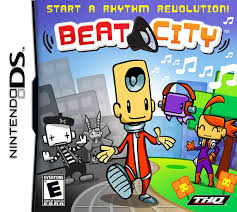
Beat City is a 2010 rhythm video game developed by Universomo and published by THQ for the Nintendo DS. It was released on April 20, 2010, in North America, and in Europe on June 11, 2010. It was the first- and possibly only- video game to be developed for a handheld system by Universomo, who mostly worked on mobile games and was shuttered a month before the game's release.
The Osu! Tatakae! Ouendan series was developed by iNiS Corporation exclusively for the Nintendo DS system and published by Nintendo. It consists of the Japan-exclusive Osu! Tatakae! Ouendan duology and its international counterpart, Elite Beat Agents, which contains the same gameplay but had its characters and themes adapted to fit a Western audience.
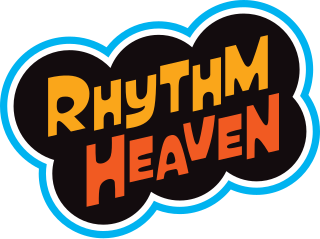
Rhythm Heaven, known as Rhythm Tengoku in Japan, Rhythm Paradise in PAL regions, and Rhythm World in Korea is a rhythm video game series developed and published by Nintendo. In the games, players play through a collection of rhythm mini-games, each with its own set of rules. The series is mainly released on Nintendo consoles, including the Game Boy Advance, Nintendo DS, Nintendo 3DS, and the Nintendo Wii. The original game, Rhythm Tengoku, was also released in arcades on the SEGA NAOMI arcade cabinet. The music is mostly composed by Japanese singer Tsunku.



















